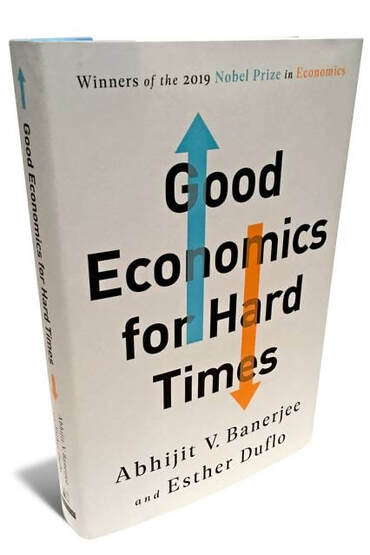|
1/16/2020 Economics is too important to be left to Economists: The haunting view of two 2019 Nobel LaureatesRead Now The Nobel Prize in Economics 2019 was awarded in November to Abhijit Banerjee and Esther Duflo, both professors at the Massachusetts Institute of Technology (MIT) jointly with Michael Kremer, professor at Harvard University. This trio has often worked together, and their joint research has been acclaimed to considerably improve our ability to fight global poverty. According to the citation “in just two decades their new experiment-based approach has transformed development economics which is now a flourishing field of research.” The book by Banerjee and Duflo, Good Economics in Bad Times is the focus of this blog. The authors are the sixth married couple to win the prize, with Dufflo being the youngest. Unlike previous winners, mostly older white males whose grand theories are built upon mathematics of dizzying complexities, they have made a name for themselves by studying the circumstances of the world’s poorest people. This Book is absorbing. It reads like a novel. It presents complex issues in simple concepts. It is, indeed, Good Economics. ____________________________________________________________________________________ The theme of this blog underscores the substance of the book, Good Economics in Bad Times by Banerjee and Duflo. In the introduction they expressed concerns about the superficial nature of public conversation on core economic issues such as immigration, trade, growth, inequality and the environment. They recognized the lack of awareness that problems facing the rich countries in the world were actually often eerily familiar to those they were studying in the developing world. In both, people are left behind by development, ballooning inequality, lack of faith in government, fractured societies and political systems and so on. The real world, they argue, is “sticky”, in contrast to the picture presented in textbooks. They write that “Economics imagines a world of irrepressible dynamism, in which rational actors respond quickly to incentives. Not so in practice." The Book is a sequel to their 2011 book Poor Economics: A Radical Rethinking of the way to fight Global Poverty. That study outlined how randomized controlled social policy trials, like clinical ones in medicine are cutting edge economic research. Their major objective is using research to fix thorny problems. And their philosophy is, rather than grand theorists, economists should see themselves as plumbers, practical ‘tinkerers’ interested above all in whether interventions actually work. “We wrote a book to hold on to hope, about where economic policy failed; where ideology has blinded us; where we have missed the obvious; about where and why good economics is useful especially in today’s world” The authors' campaign is for vigilance against bad ideas. They elaborate the dynamics of “transitions”, meaning how people shift from job to job or from one region to another or how the unemployed, anxious about risk and attached to where they live, are much less likely to move far to seek work than economic theory suggests. Overcoming bad ideas are elaborated in various scenarios throughout the book. Takeaways that seem to diverge from traditional economics include:
A startling revelation based on actual surveys undertaken in various regions both in the developing and developed world is that people mistrust economists with only politicians ranked lower. Hence corrective action requires recognizing that the world is a sufficiently complicated and uncertain place and that the most valuable thing economists have to share is often not their conclusions, but the path they took to reach it. This means highlighting “the facts they knew, the way they interpreted those facts, the deductive steps they took, the remaining sources of their uncertainty.” Economics, when done right, can help solve the thorniest social and political problems. Banerjee and Duflo highlight the need for careful programme design to break through on some of the most intractable challenges. Drawing on the World Inequality data base between 2000 and 2018, they came to the amazingly bleak conclusion that “figuring the way out of this impasse [elimination of inequality] poses greater challenges than space travel, perhaps even the curing of cancer.” This is due to people’s distrust of government, the elite , NGOs, the private sector and different social groups. Yet they remain optimistic that "what we as economists have learned best to do, is to be hard headed about the facts, skeptical of slick answers and magic bullets, modest and honest about what we know and understand, and perhaps most importantly, willing to try ideas and solutions and be wrong, as long as it takes us toward the ultimate goal of building a more humane world". Good Economics based on a wealth of community based research strongly suggests the high social value of, say, early childhood education, investing in human capital and gender equity. It also shows that immigration and inequality, globalization and technological disruption, slowing growth and accelerating climate change are sources of great anxiety across the world. The resources to address these challenges are there. Lacking, however, are ideas that will help jump the wall of disagreement and distrust that divides us. Hence the protection against bad ideas is to be vigilant, resist the obvious, be skeptical about promised miracles and resist quack remedies that replace policy analysis. To them the call for action is not just for academic economists, "it is for all of us who want a better, saner, more humane world. Economics is too important to be left to the economists" Eddie Greene
3 Comments
Gem Fletcher
1/16/2020 04:16:47 pm
Will be on the must read list for all of us interested in marrying the old established theories of developmental approaches with the rapidly changing physical and social environment confronting us.
Reply
1/17/2020 04:58:47 am
Excellent review and out-of-the-box thinking… thanks for this. Richard
Reply
Leave a Reply. |
Details
AuthorEdward and Auriol Greene Directors, GOFAD. Archives
April 2022
Categories |
Global Frontier Site Links |
Contact InformationEmail: [email protected]
Twitter: @GofadGlobal |

 RSS Feed
RSS Feed
